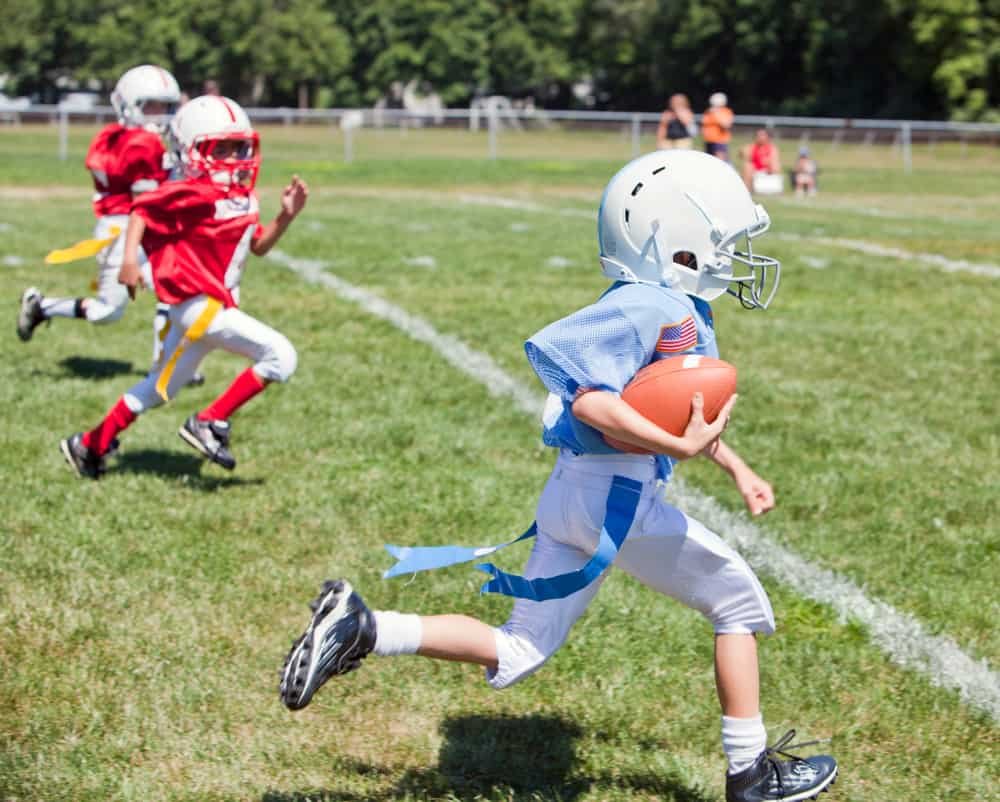
Outdoor activities, as well as sports, are an essential part of school life for your kids. As much as their academics and capacity to learn is important, so are their physical abilities for growth. On the list of all the different sports and athletics alternatives available for kids, these days, a popular one is called Flag Football.
Flag Football is similar to traditional tackle football, only that instead of tackling the player with the ball, you remove a hanging “flag” or strip of cloth from the other players’ mid-waist of their jersey. This form of football has been proven to be much less physically traumatic on players and a safer alternative to the traditional version. It is a newer development than most sports-based activities out there. It is just like American Football or Rugby in form and style of play. But what makes Flag Football stand out as different and a good idea for kids these days is the reduction in physical contact.
The strategy of Flag Football has players running after the ball with flags on them. Instead of tackling or abruptly colliding with a player on the opposing team, players have to reach for these flags and yank them off the other team player’s belt.

Flag Football is a twenty-first-century version of this favorite sport that leaves the risks behind and still keeps the fun of the game. So, if your kid likes to run around and wants to play an intense sport, but you want to keep them away from as much injury as possible, Flag football might be a great alternative.
These are 14 reasons why your kids should play Flag Football.
1. Just like regular Football but without the bruises.
Flag Football is a sport that takes the grit out of the game but in a good way. This means that players do not make any physical contact either in a defensive or offensive maneuver to get the ball back from the other team.
Instead, the players start the game each of them wearing belts. These belts have flags attached to them that the opponent team has to pull off other players to deter them scoring instead of tackling or pulling at them. This way, the rules of tackle football remain the same, but without the need or danger of threatening physical aggression or tussling.
2. All skills and no bumps.
With the coming of this new form of an old game, Flag Football allows players to not depend on brute force to score points. Instead, players of Flag Football get to concentrate more on building skills that will help socialize and prepare them for life both on and off the field.
Some of the skills that kids learn to develop through Flag Football is strategy-building, a sharp mind, teamwork, self-control, and self-discipline.
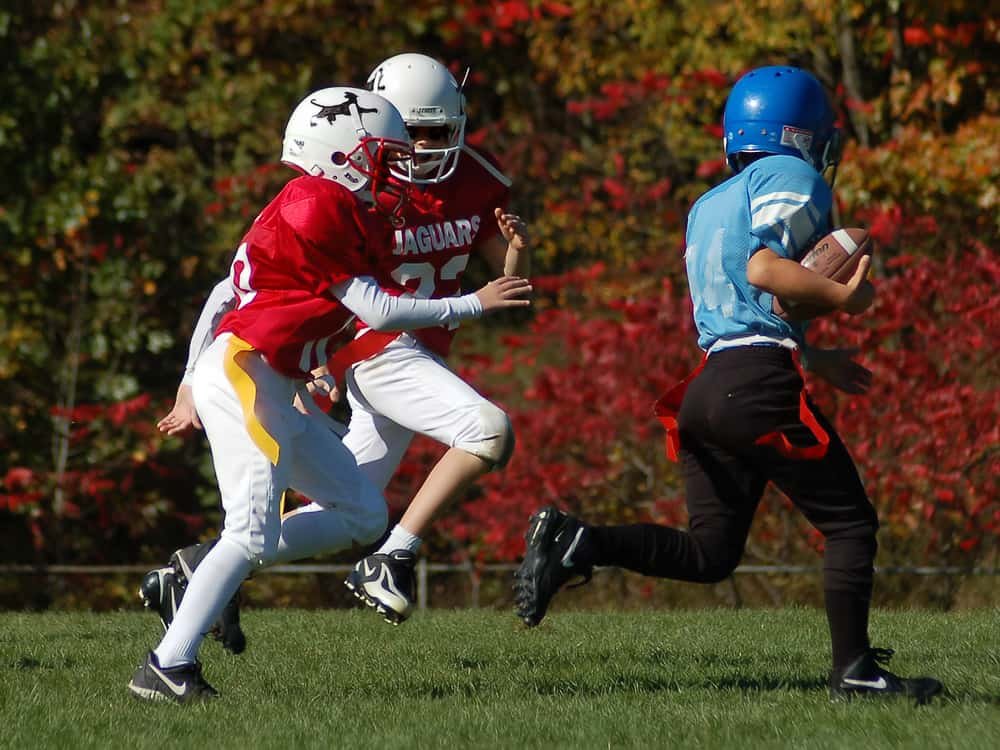
Flag Football is not just a no-contact sport. It is one where any physical contact between players during a game is not allowed. Failure to comply with this main rule can lead to penalties and even disqualification from either or both teams.
3. Less equipment needed to play.
With the removal of physical contact in football comes the futility of safety gear. It is no longer required to the degree it used to be needed.
The invention of safety gear, along with all those shoulder guards, padding, and helmets, was for protecting players from suffering any serious injuries. These happen in situations where there is a collision caused by a player or players crashing into each other. Another situation is where the other team crashes into their opponents as an act of offense or defense.
Also, the traditional training for tackle football style of playing requires a lot of expensive equipment that has to do with physical growth and building muscle mass. This is not required for flag football, thereby making it an anytime-anywhere kind of game that any kid can play.
4. An outdoor activity for physical growth.
Many modern standards of living have led to many sedentary habits that are not healthy or even actually entertaining and beneficial. With the coming of the internet and game consoles, kids these days tend to stay indoors and stare at screens that deprive them of fresh air and much-needed sunlight.
Flag Football is a great way to make sure that your kid’s experience with the outdoors is both productive and also suitable for their overall health.
Instead of banishing your kids to go outdoors and spend some time on the field, you can sign them up for summer camps for flag football. This way, kids get to be surrounded by an environment that will help them hone their physical and mental skills better. It will also help them learn how to build connections and friendships over a game of flag football.
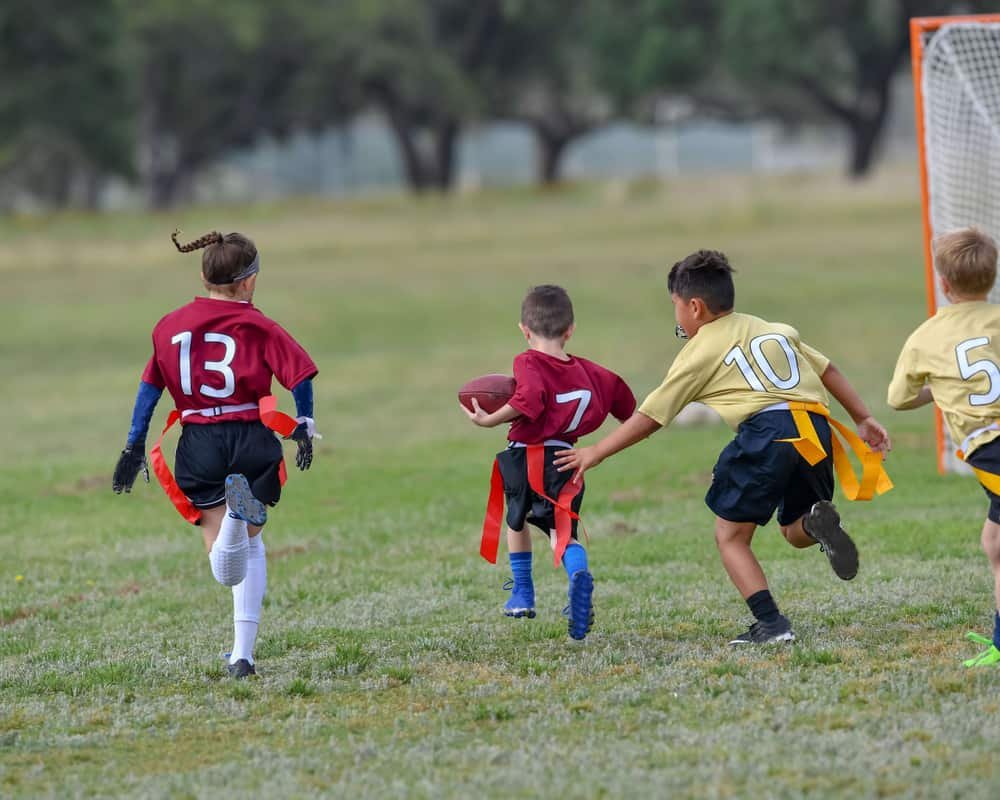
5. Fewer costs for parents.
Flag football is a game where players have to wear a belt with a flag hanging on them. Besides a simple harness for the flag, this game pretty much does not have anything else in terms of equipment.
On the other hand, tackle football requires their players to be covered from head to foot in full professional gear at all times. This means that parents have to dish out more money to buy replacements from time to time. But that is not the case for flag football.
6. Research and studies support Flag Football.
According to Dr. David Geier, an orthopedic surgeon, as well as a sports medicine specialist, kids should stick to Flag Football until the age of fourteen. This is because this age group centers around growth spurts that form an important part of developing into adults.
Besides, playing this tackle-based aggressive sport, especially during the growing phase of your child, could lead to detrimental physical damage, bone deformities, and even risk the length and quality of their lives.
7. Potential neurological problems in Tackle Football.
Not just professional players, any avid watcher of tackle football can tell you that playing this game has a lot to deal with getting trampled, tackled, and hit, especially in the head.
There are several cases where Pro Football players who have retired suffer from the aftereffects of prolonged exposure to tackle football. These have been seen to cause brain damage that leads to the early onset of amnesia, dementia, and mood disorders. This problem is not only reserved for Pros but also any player of the sport, especially kids, who are more likely to sustain an injury to the brain more easily than full-grown and well-trained adults.
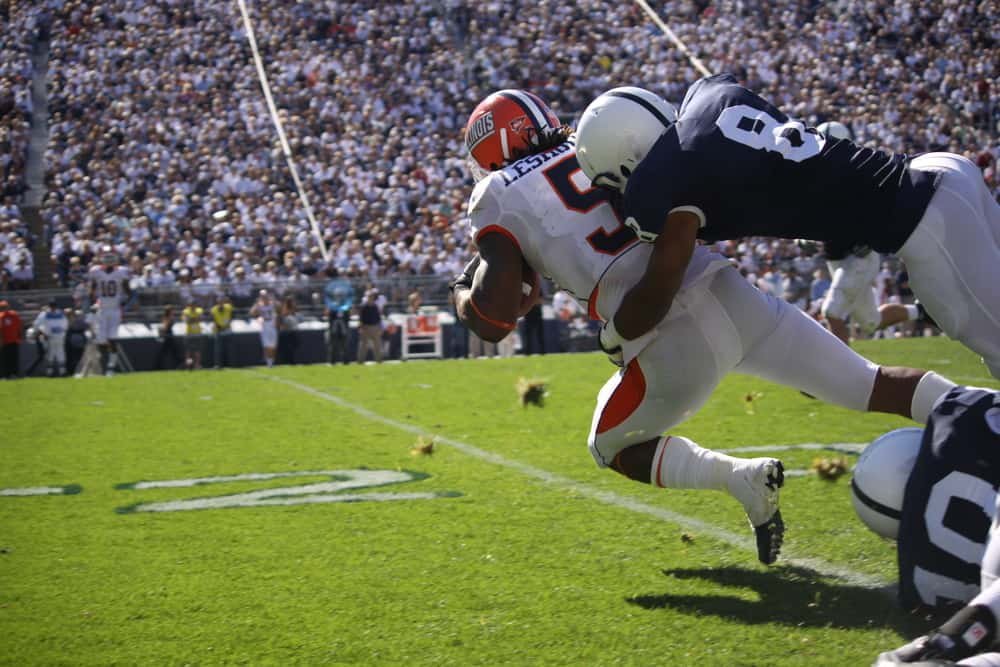
8. They can still go Pro.
Just because your kid signs up for flag football does not mean that they have no future in the realm of professional sports.
Contrary to popular belief that flag football is tame and unlike real Football, there are national Flag Football Leagues that are dedicated to investing in players to play professionally. An example is the American Flag Football League (AFFL) that organizes and hosts professional Flag Football tournaments on a national level. There are similar Flag Football Leagues in other countries such as Canada, South Africa, Denmark, etc.
9. Less stress, pressure, and risk.
The thought of playing tackle football is something that does not make all parents proud. In fact, it is a sport that leaves some parents fearing for their kid’s life and health.
Kids are too young to understand the heavy-handed tackle style of football and how it is difficult to get out of. This is because of the social values and notions attached to tackle football that see it as a rite of passage or a symbol of masculinity. This sometimes leaves kids stuck in peer pressure that drives them to play the game for years under a lot of stress and with a lot at risk.
Flag football is a great way to get your kid acquainted with the game without bearing the stress that comes with Tackle Football.
10. Therefore, more fun!
Flag football takes the aggression out of football, as well as the dangerous physical aspect of the sport. This way, kids can concentrate more on having fun.
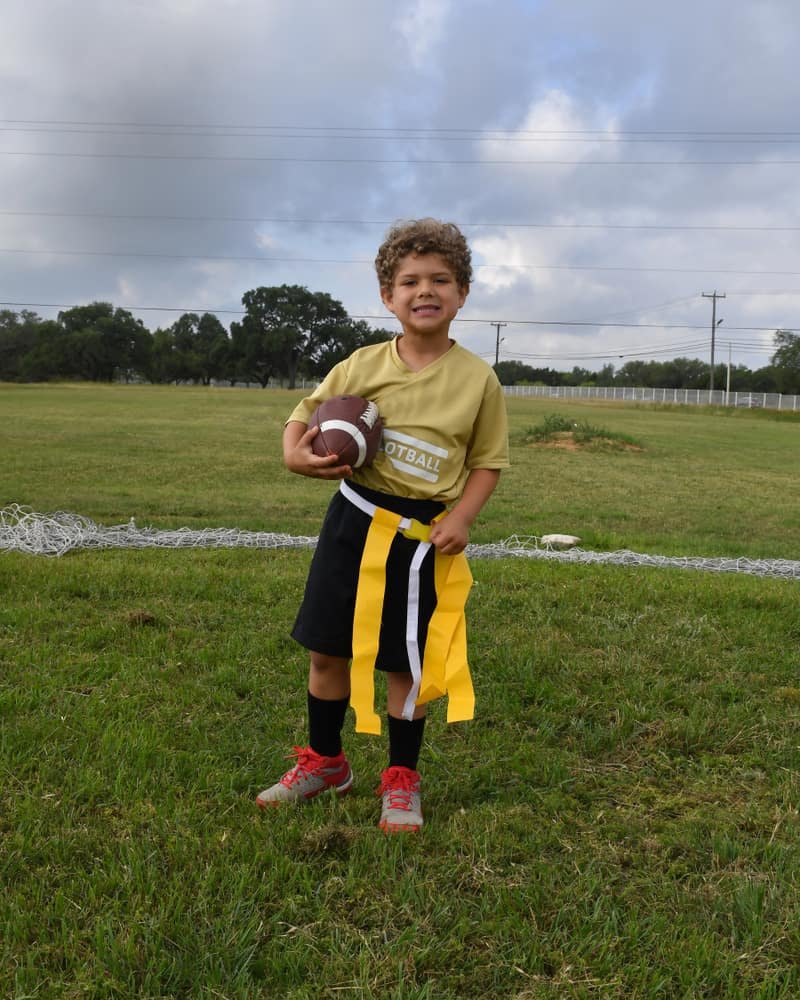
The kids build character and a positive outlook in terms of how they are expected to behave both on and off the field. They also get more nimble from evading enemy team members from yanking their flags off. This leads to mental exercise as well as a physical one where the kids have to think on their feet.
Without the fear of collisions and overly-passionate opponents hurting them, kids automatically have more fun.
11. A balanced life.
Another aspect of Flag Football that parents will like is that flag football has shorter practice sessions and take up less time on a weekly basis when compared to tackle football.
Players are expected to have three to four times a week or even less, which gives them more time to study as well as on other aspects of their lives. This gives Flag Football the added advantage of giving kids more balanced lives where both sports and other activities lead to their personal growth.
12. Both boys and girls can play from a young age.
Flag football is a game where both girls and boys are encouraged to play. Kids from both genders can enjoy the thrill of the game without the fear of running into a player that results in a bloody nose or a bruised head. The lack of continuous exposure to physical injury and sustained aggression, makes Flag Football a game where fun becomes the motto, and safety becomes the rule.
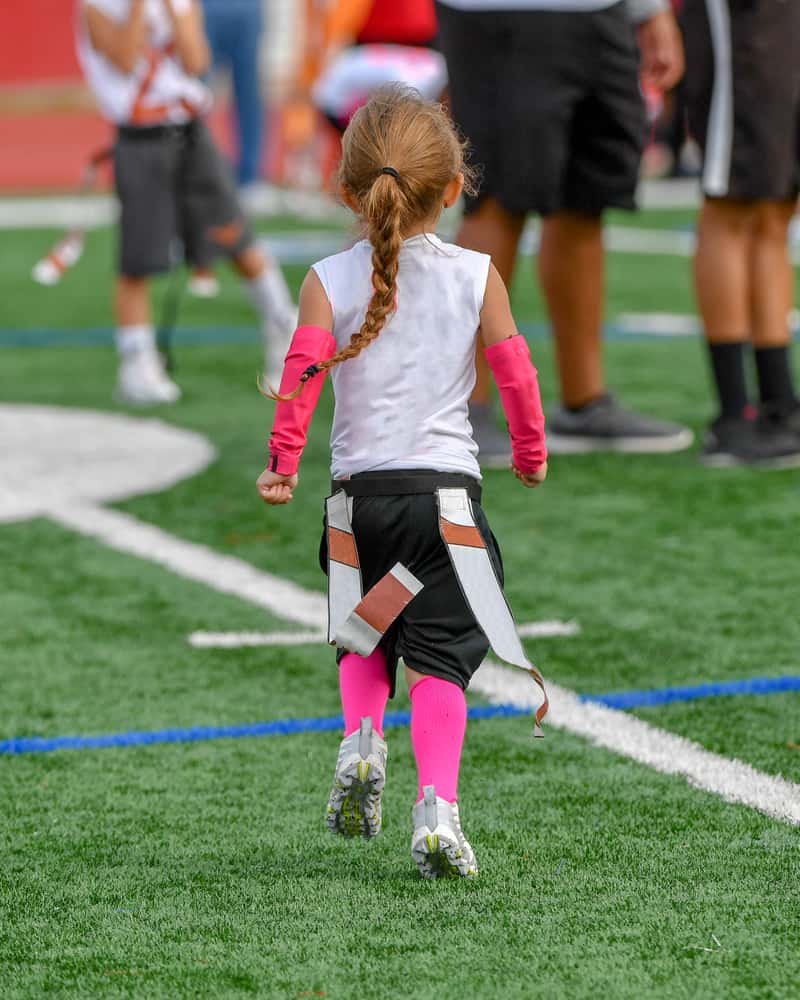
Kids as young as six can start learning the basics of the game and start learning how to develop themselves into balanced human beings. Physical fitness and good sportsmanship are vital components of this sport that every member of society can benefit from, including players and parents.
13. It’s becoming more accepted and popular.
There are many places around the world, especially in North America that are making a move towards instituting flag football as a school sport that goes on until the kids attain the age of at least fourteen. This ensures that any growth that the child has to undergo is uninhibited. But there is no bar against shifting from flag football to tackle football afterward if that is the desire of the player and parents.
14. A positive impact on society.
Some studies show that communities with kids who play flag football compared to tackle football see an increase of better civic sense and socialization. This is attributed to the fact that flag football does not require aggression or hot-bloodedness to excel at the game.
Flag football has all the positive aspects of regular football but without the physical risks. It’s a sport that requires kids to make informed decisions on the field; to strategize, and stop opponents from getting the ball. All this, while making sure that their individual flag stays far away from their opponent’s reach. It also requires kids to concentrate on the game and be kept sharp in terms of where their opponents are and also whether their teammates are nearby.
Taking everything into account
Flag football is a sport with little to no risk in terms of physical, as well as neurological trauma. Kids can enjoy the aesthetics of the game and not on causing trauma to their opponents. It is a good, healthy competition that is under-rated in the sense that it is not a game for weaker or more fearful people but one that understands the risks of tackle football and mitigates it.
This game is both instructive and productive for kids as well as the community at large.
What about tackle football?

It is entirely understandable that tackle football still has a lot of its original charm and also the favor of its fans that has people ramping up in anticipation before every football season begins. The NFL, among other leagues, spends a lot of money to bring entertainment and showmanship to the sport. But the pursuit of fame and notoriety not always goes well, especially at an early age.
